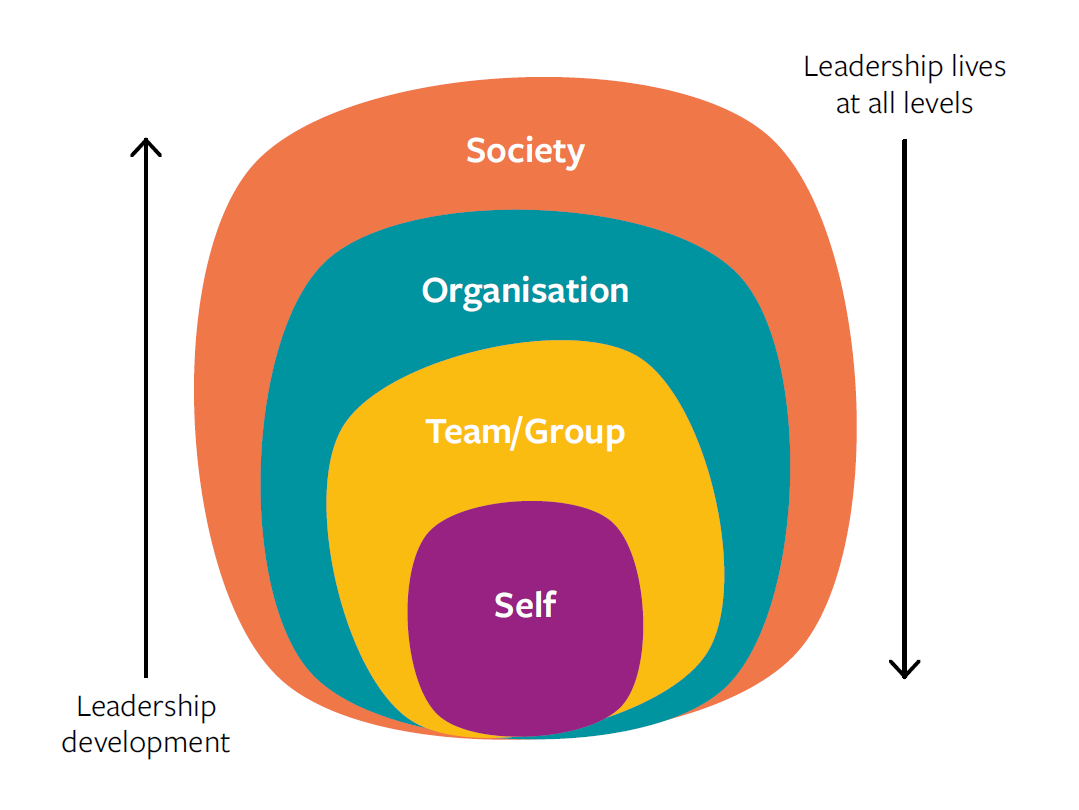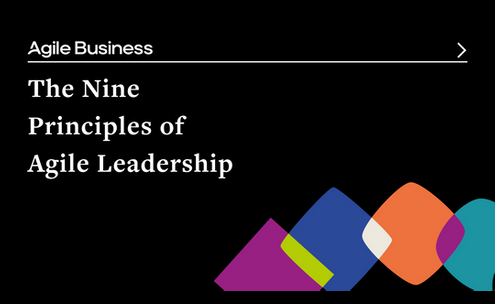Principle 6: Leadership lives everywhere in the organisation
Self-awareness; responsibility; commitment; servant leadership; mentoring
Agile Leadership should permeate all aspects of an organisation or change initiative. Realising the leadership potential of all its people helps accelerate the organisation’s ability to learn and adapt. The work of an Agile Leader is to develop depth in the organisation’s leadership capability by providing opportunities for their people to lead. Mentoring tomorrow’s leaders in the principles and practices of servant leadership sows the seeds for the agile culture to thrive.
Agile Leadership needs to live and breathe at all levels of an organisation, rather than being something that is found only at the pinnacle. This is especially important during times of change.
Leadership should apply at all levels in the organisation. It is not just something done by the leaders, i.e. a person who leads a team, a group or an organisation. This principle is about seeing leadership differently. Agile Leadership always starts first by looking at Self (individual level). Individuals are part of teams or groups which in turn sit within an organisation. An organisation itself is part of the wider society, community and the country in which it operates. This whole ecosystem can be seen as a complex adaptive system, dynamic and continuously evolving.

Self-Leadership is about having a developed sense of who you are, what you can do and where you are going. This is coupled with the ability to influence communication, emotions and behaviours on the way to getting there. Agile Leaders are those who take personal responsibility for their actions and hold themselves accountable for their decisions. They lead by example and encourage colleagues to behave in the same way.
Team and Group Leadership is about exploring what principles need to be in place for teams or groups to be self-organising and manage change. The work of the Agile Leader is to create an environment where people can realise their potential. Agile Leaders develop leaders; they encourage their colleagues to take responsibility and hold themselves accountable for actions and decisions.
Organisational Leadership is about creating and sustaining a culture where individuals, teams and groups can evolve from doing Agile to being Agile. It is also about recognising and understanding that leadership development is an ongoing practice. This requires commitment to investment in a continuous process of leadership development. By having leadership development pipelines in place, organisations can help individuals realise their potential through developing their Agile Leadership knowledge, skills and capabilities.
To deal with complexity, the journey has to start with ourselves as individuals; only then can one lead the teams, groups and organisations effectively in an agile way.
Servant leadership
Servant Leadership fits the Agile Leadership model well as it is both a leadership philosophy and set of leadership practices. Traditional leadership generally involves the accumulation and exercise of power by one at the “top of the pyramid.” By comparison, the servant-leader shares power, puts the needs of others first and helps people to develop and perform as highly as possible.1
The only way to lead when you don’t have control is you lead through the power of your relationships. You can deal with the unknown only if you have enormous levels of trust, and if you’re working together and bringing out the best in people. I don’t know of any other model that can truly work in the world right now except servant leadership2
The agile leader as mentor
The agile leader will take responsibility for bringing on all members of the team, helping them develop to their full potential. In this role of mentor the agile leader needs to demonstrate active listening skills and the ability to ask challenging questions. A good mentor also needs to be comfortable being challenged themselves and must be able to give and receive valuable feedback, as discussed in Principle 3.
To be an effective mentor the leader must demonstrate emotional intelligence, self-awareness, empathy, motivation and mindfulness… all characteristics highlighted in the 9 Principles of Agile Leadership.
….being a mentor is no longer an unnecessary, expendable task. Instead it will be a rewarding one for you that has a profound impact on others3
Agile Leadership integrates Servant Leadership, mentoring and personal development; it is an ongoing commitment to developing yourself and your people at all levels in all aspects of leadership.
Sources
- Definition from Wikipedia
- The Servant -Leader: From Hero to Host - Margaret Wheatley, 2002
- Seven Ways To Be An Effective Mentor - E. Wayne Hart, Forbes, June 2010
Author

Agile Business Consortium
The Agile Business Consortium is the professional body for business agility. We’re all about community – whether you’re a multinational working through a large-scale transformation, a new start-up, or a contractor, we can support you to achieve more, to grow more, and to build your business agility. As a global not-for-profit organisation that’s been around for over 25 years, our knowledge and experience around agile competencies and behaviours can offer you the guidance you need to reach your agility goals. Together with our partners, we create and share agile research, case studies, resources and tools that help you compete in today’s uncertain world. A registered not-for-profit, we’re the world’s longest-standing agile-orientated organisation. We’re the brains behind AgilePM®, AgileBA®, AgilePgM®, AgilePfM™ and AgileDS™. Based in the UK, we have members in over 30 countries around the world.
Email: [email protected]
- Twitter:
- @Agile_Biz
- Website:
- www.agilebusiness.org
- LinkedIn:
- https://linkedin.com/company/agile-business-consortium


